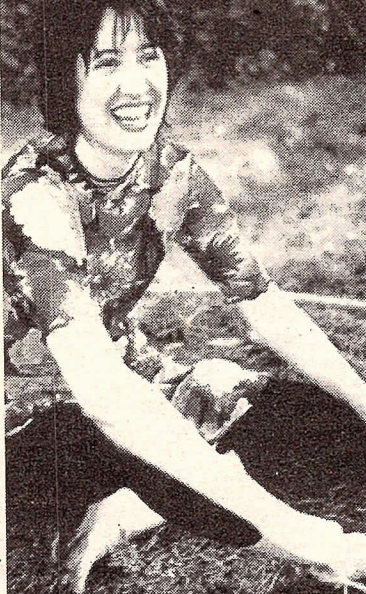Shocked breaks free from label slavery

Michelle Shocked is a kindhearted woman, but she didn’t think her former record label, Mercury, was being so kindhearted to her when it refused to fund the recording of not one, but two albums after 1992’s Arkansas Traveler.
The reason the label told her was that the material was “artistically inconsistent.” While Mercury refused to support her music and promote her work, it also refused to release her from her contract.
So, Shocked, like David taking on Goliath, decided to fight for her freedom.
Invoking the 13th Amendment to the United States Constitution – the one abolishing slavery – she sued to get out of her contract.
“The 13th Amendment citation was a rather sensationalistic one. It raised a lot of eyebrows,” she said between bites of an orange while in an Indianapolis phone booth last week. But the suit also claimed Mercury was in violation of a California labor law that requires renegotiation of personal service contracts every seven years.
Shocked said the law is not well known, and labels would like to keep it that way. Otherwise, they’d have to renegotiate artists’ contracts much more frequently. Her lawsuit, filed in August 1995, was settled out of court in April.
“I didn’t win; I didn’t lose either,” Shocked said. “They didn’t want it to go to court. They don’t want people to know that the law exists.”
She said she had been told flat out by Mercury that they would never promote any album she made because, unlike most naïve artists, she cut too good a deal when she signed.
“I was one of the few artists who owns her own masters,” she said. She also made sure she financed her tours herself, so she wasn’t in debt to the label. Typically, young artists take big advances, then wind up owing so much to the label, they rarely see royalty checks from record sales and can find themselves in the position of having their contracts sold to another label so the seller can recoup its outlay if their records don’t become hits.”
What Shocked did during her nearly four-year battle with Mercury was release Kind Hearted Woman on her own. An intensely personal album full of tales of sadness, sorrow, resignation, and redemption told in rural settings, the stark album signaled Shocked’s determination not to let the label get the better of her. It was available only at her concerts – until one month ago, when a re-recorded version with touring friends Peter O’Toole and Fiachna Ó Braonáin of Hothouse Flowers was released by her new label, Private Music.
In a situation unique in the recording industry, one Shocked said she believes will have major repercussions, she signed a non-exclusive contract with Private. That means she’s free to shop her work to other labels if Private chooses not to release something during their two-record deal. As part of the settlement with Mercury, that label just released a compilation titled Mercury Poise: 1988-1995, containing cuts from Shocked’s three Mercury albums, the “stylistically inconsistent” Short Sharp Shocked, “=Captain Swing, and Arkansas Traveler.
Commenting on their musical directions, which travel like a quirky roadmap through folk, swing-jazz, bluegrass, and other genres, Shocked said, “Mercury allowed that confusion to reign because they either chose to ignore or didn’t listen” when she signed with the label and announced she planned to make three distinctly different albums. They were meant to be a trilogy, and they knew that, she said.
Shocked got to name the Mercury compilation; she made it a reference to a Graham Parker single called “Mercury Poisoning” – a comment on his own woes with the same label.
Though she says she’s not bitter, Shocked, who vowed not to cut her hair till the ordeal was over, has known despondency.
“There comes a point when you’re just as absolutely down as you can ever be,” she said. But she also has learned how to reclaim her lost joy.
She found it again “By having a sense of courage, a sense of adventure, a sense of faith and hope. To try to live your life with a sense of faith and hope. To try to live your life with a sense of joy,” she said, “you’re admitting how vulnerable and tender you are.”
But, she added, one has to grow and change and take on challenges and risks, and not be afraid of failing, to gain a sense of accomplishment, and to be in touch with the little joys “that kind of build a slow steady process where you’re just living a joyful life.”
Added to Library on April 26, 2020. (124)
Copyright-protected material on this website is used in accordance with 'Fair Use', for the purpose of study, review or critical analysis, and will be removed at the request of the copyright owner(s).
